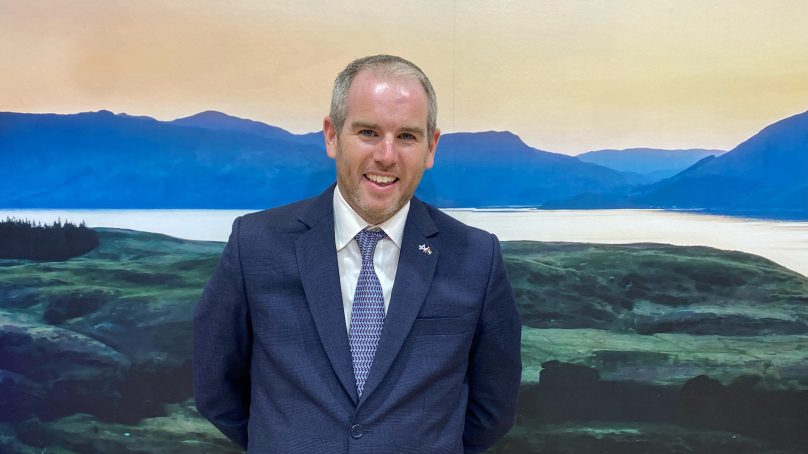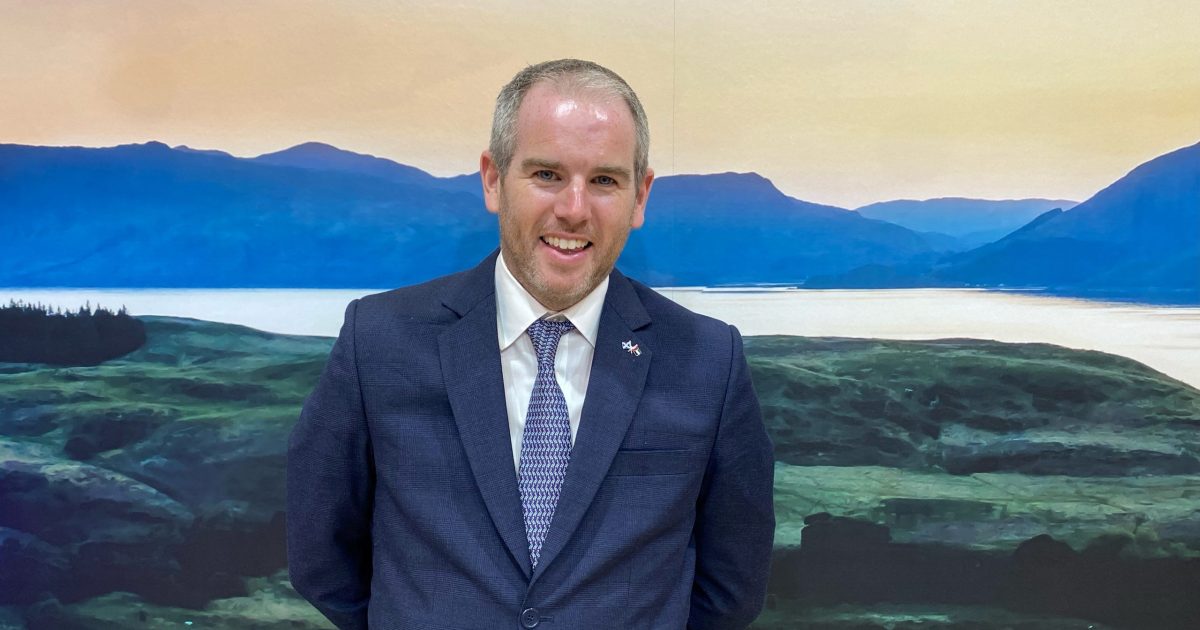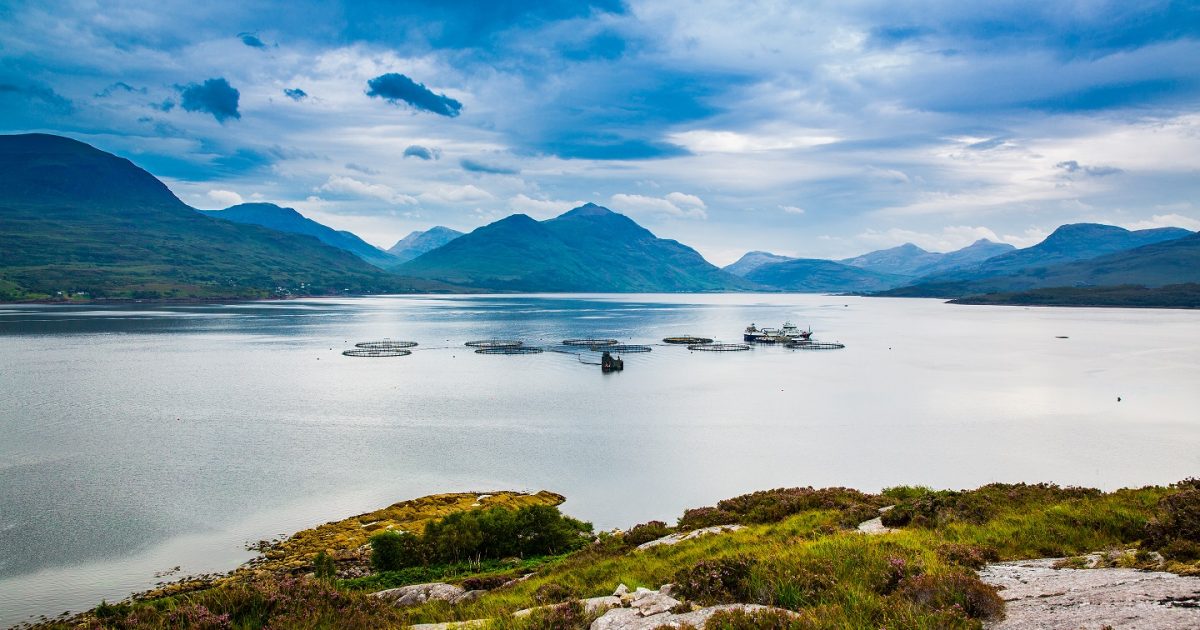In an exclusive interview conducted at Gulfood earlier this month, James Keating, regional director of the Middle East and head of consumer industries EMEA of Scottish Development International (SDI), gave us the lowdown on Scottish exports and expansion plans in the region.
Can you tell us why the UAE is one of SDI’s key markets for international expansion and how Gulfood is helping you achieve your goals?
Scottish Development International (SDI) is the Scottish government’s economic development agency. It is tasked with increasing exports from Scotland to the world, and in this case, the UAE.
We’ve been visiting this region for the past 10 years, and it’s always packed with people from overseas who seek products of the highest caliber which Scotland offers. Therefore, we are really dealing with a captive audience. So much so that we now have a full-time employee who specializes in the food and beverage markets headquartered in Dubai. It is important to note that we export food and beverages worth over GBP 300 million to the MENA region, and we anticipate exceeding it in the near future. As you can see, we have a wonderful mixture of customers and companies that we are promoting. I believe Gulfood is a perfect fit for our premium products.
Scotland’s food exports have increased 111% since 2007 to almost GBP 1.5 billion, with salmon and seafood leading the way. What are some of your success strategies for securing lucrative opportunities in premium retail and food markets like the UAE?
I believe that having a really strong brand is essential to the success of our strategies, we are extremely fortunate to be known for having the best seafood and salmon, for example. People around the world have a connection with and an affinity for Scottish produce, so they purchase it upon visiting any supermarket. The primary reason is that many of our businesses are run by families that take great care in what they do. Many have been doing this for generations. In many instances, they have developed a premium product that is ideal for export and in high demand around the world. So, it all comes down to heritage and providence.
The landscape is the second justification. The magnificent landscape is conducive to crop production.
We basically help Scottish companies export by conducting intelligent market research, leveraging our international and domestic connections, and giving them a platform. We help companies seek opportunities. Premium quality Scottish products make our job easier. By the end of March, we are planning a luxury seafood iftar for clients and prospects in Dubai. There are a lot of additional planned activities.
You’re showcasing Scottish seafood brands for the first time at Gulfood 2023. In your opinion, what makes these products stand out and what are some of the key trends you’ve noticed in the seafood sector?
Scotland’s unique combination of factors, namely our people, landscape and waters, makes our seafood products stand out. Our fishermen have been custodians of the sea for generations, taking great care to ensure that the shellfish and salmon that they harvest have a naturally sweet taste and high omega-3 content. Even our farmed salmon, which starts off in hatcheries, is raised in such natural environments that they don’t even resemble farms. In Scotland, we farm and fish over 60 different species, giving customers a wide range of delicious and sustainable seafood options to choose from.
When it comes to customer trends, we’re seeing a growing interest in sustainable and locally sourced seafood, as well as a desire for more unique and authentic culinary experiences. These trends are quickly gaining importance, but the UAE and GCC consumption outgrows their supply. So, there is always going to be a need for product exports, and the region always seeks premium products. Salmon is in high demand, and the shellfish market is trending. Clams, mussels(removed) Langoustines, oysters, scallops, lobsters and white fish are also rising in popularity, but now people are increasingly asking for Scottish produce.
In what ways is the Scottish Pavilion at Gulfood driving sustainability and innovation in the F&B sector?
Scotland holds the distinction of being the first country in the world to declare a climate emergency. While many countries, including the UAE, have set 2050 as their year for net zero, Scotland has set a more urgent deadline for 2045, underlying the crucial importance of sustainability. This commitment to preserving the environment and ensuring a sustainable future is deeply ingrained in Scotland’s heritage, reflecting a responsibility to future generations. Sustainability is thus a top priority for companies in Scotland.
Scotland Food and Drink, a key trade association, offers a “Go Green” toolkit to help businesses become more sustainable. Two companies in particular demonstrate Scotland’s leadership in sustainability: an alcohol company with a hydrogen-powered distillery and VE Air(Veg Ware), which focuses on plant-based biodegradable packaging for food and drink products. Scotland’s natural landscapes and innovative spirit will be critical in achieving a sustainable future for all.
In your opinion, how has cross-border collaboration in the F&B industry developed over the last few years in light of food inflation and the geopolitical crisis? What trends are we likely to see in 2023?
Collaboration is key to achieving sustainability, and Scotland has been fortunate to have strong partnerships with industry and trade associations like Seafood Scotland. We work hand in hand with our partners to promote Scottish products globally. Our in-market specialist in Dubai is dedicated to building connections and collaborations with UAE and GCC entities, thereby facilitating international cooperation.
Scotland, like many other countries, has had to deal with challenges like Covid-19, Brexit and inflation brought on by the Ukraine-Russia war. There is a strong need for government-led initiatives and international cooperation to lessen the impact of these issues.
For example, in the UAE, there is a growing need for vertical farming, and Scottish businesses like Intelligent Growth Solutions are the vanguards of this cutting-edge technology, which designs, supplies, and supports vertical farms for growers all around the world. We blend our engineering, crop science and agronomy skills to build the best technology to allow our customers (the growers) to succeed, IGS uses Total Control Environment Agriculture (TCEA) to manage each stage of the growth cycle and all operational inputs. The software determines optimal recipes of weather and manages the operation of the farm: lighting, watering and ventilation as well as applying nutrition.
Thus, they could help the UAE achieve its vertical farming goals and even plant mangrove saplings, amongst other things.
While local sourcing is the latest craze, it will be challenging for countries to be entirely self-sufficient. Therefore, premium exports will always be in demand. Scotland has a reputation for producing high-quality products, and we aim to meet this demand in the UAE market. Through cooperation and innovation, we hope to build a sustainable future, in addition to promoting Scottish goods.
















